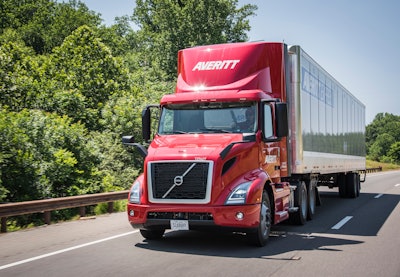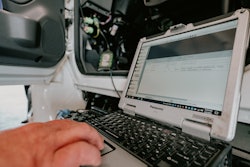
CCJ Innovators profiles carriers and fleets that have found innovative ways to overcome trucking’s challenges. If you know a carrier that has displayed innovation, contact CCJ Chief Editor Jason Cannon at [email protected] or 800-633-5953.
The term dynamic pricing is nothing new in the less-than-truckload (LTL) industry, but one carrier has created a new tool that diverts from the traditional meaning.
Cookeville, Tennessee-based Averitt Express (CCJ Top 250, No. 22) recently went live with its ExactRate dynamic pricing engine, following three to four years of development in conjunction with the Averitt IT and pricing team and LTL technology solutions provider SMC3.
The tool instantaneously generates a 100% cost-based price that reflects market dynamics, and it has expanded Averitt’s ability to garner more business, said Director of Pricing Mike Sanders.
“Dynamic pricing is a term that's been kicked around for at least 15, 20 years. But historically, dynamic pricing programs are really just an array of discounts off of an old traditional freight class and rate tariff construct, and the carriers adjust the discounts up or down to encourage more aggressive pricing where they have need to fill capacity. It's dynamic in that it changes and carriers alter it periodically based on need, but it's still really just using the same freight class and rate tariff construct that the industry has been using for 100 years,” Sanders said. “We’re returning an individual quote for each individual shipment based on its own characteristics, whereas historically what the industry has done is juggled discounts and flat charges based on averages or an aggregate of what a customer's business represents. This is much more surgical.”
ExactRate is not based on any rate tariff. It generates a single net charge for the shipment plus line-item charges for any applicable accessorials. Shippers’ freight audit and payment processes must allow for a net, dynamic rate (no tariff/discount breakdown, no line-item fuel surcharge).
ExactRate evaluates Averitt’s estimated costs and real-time demand to provide accurate and serviceable rates that align with market conditions and accurately reflect operational costs.
To access quotes from the tool, shippers must establish an API connection with the ExactRate application or sign up on the Averitt Connect TMS. In that API interchange, the customer specifies the dimensions and weight of individual units as well as any additional required services like residential delivery, for example. Each quote then comes with a unique alpha-numeric quote ID that must be included on the bill of lading. Then they receive an invoice that corresponds to the quote they were provided.
Sanders said if a customer does not have the ability to provide the dimensions of each potential shipment, this isn't a practical tool for them. For the customers who can meet that requirement, if a unit goes through one of Averitt’s dimensional scanners and the weight and dimensions input during the initial quote are wrong, Sanders said Averitt still uses the same logic, fairness and price aggressiveness to provide a revised quote based on the new circumstances.
“Under the traditional approach, you can get a price and if the freight class changes or if services weren't requested on the bill of lading but asked for at the time of delivery, the price could variably change. In this instance, it doesn't matter really what the freight class is. It's irrelevant. If a customer is trying to use a freight class that they think is correct, and it's wrong, or they're using what someone told them was accurate and it turns out to be incorrect, the price can change dramatically,” Sander said. “In this instance, if they can provide the dimensions and weight accurately up front, then they get a price that is as transparent as can be, and it's returned immediately and won't deviate unless the dimensions and weight of that individual shipment change.”
The quote is returned based on Averitt’s costing system, which takes into account characteristics with a preset margin given Averitt’s capacity, lane balance, system efficiencies, etc.
Like many LTL carriers, Averitt reconciles every single expense to every single LTL shipment each month using SMC3’s LTL cost intelligence system. Sanders said Averitt has a detailed idea of what its expenses are to handle potential business everywhere in its network: every single lane, zip code, P&D area and shuttle schedule.
No staff member is required to watch as individual requests are returned because it takes place instantaneously, but Averitt has a dashboard that allows it to make adjustments to target margin.
“They may be much thinner margins in lanes where we have partial empties, capacity either in our P&D network or in our line-hall schedules; we may have them where we have greater efficiencies than others or we need to add volume in other areas where we have less capacity; those margins are set to higher or lower levels,” Sander said. “We are viewing every single day all of the opportunities that are coming our way, not only what we secure but also what is quoted and we don't secure, and we can evaluate on an ongoing basis what those target margins need to be, what concessions, what price adjustments up or down need to take place given the opportunities we're seeing.”
He said the tool gives Averitt the ability to react to opportunities in real time and make adjustments – more or less aggressive – hourly, daily and weekly.
And the opportunities are abounding with this new pricing system.
Sanders said Averitt has had lesser or greater success customer by customer.
“We've had some customers get on and where we were handling five or 10 shipments per day, we've seen that triple or quadruple. We have seen some customers being quoted, and we haven't seen any shipments yet. I don't know if that's because they're shopping, or if they’re uncomfortable with the process, or if we're returning prices for their shipments that they deem aren't competitive,” he said. “But at a macro level, the customers who've been added to it, we're doing at least three, four times more business than we were doing for that group of customers prior to the implementation.”
And it has helped the company secure larger, more dense shipments with inflated revenue by nine to 10 times, as well, he said, because Averitt is able to provide a little more aggressive pricing than a traditional discount program may have.
“What tends to happen in the old, archaic LTL industry pricing construct, every carrier gives a customer a discount off of some rate tariff. The hope is, based on a customer's entire book of business, that the sum of those parts offer a decent margin for the carrier and an aggressive enough price for the customer that they're happy with it,” Sanders said. “But in that approach, you have some shipments that the carriers lose money on and some that they're charging a premium price. It's just the carrier’s hope that whatever a discount combination they give a customer, the sum of those parts are positive for both parties.”
With Averitt’s new approach, because each individual shipment is given a price based on a tolerable margin from the carrier standpoint, Sanders said it is a cheaper price in many instances. But that’s not always the case. In some instances, he said it may be a less aggressive price but one that is more equitable for both parties based on the characteristics of that individual shipment.
If a customer doesn’t like the price, which is based on a minimum target margin that Averitt “can live with,” then Averitt is comfortable not gaining that business, Sanders said.
“Over the last 10, 20 years, it's become much more a shoppers world – an Amazon world – where people are rate shopping every single potential shipment,” he said. “As that becomes a larger share of the LTL industry pie, this provides hopefully an attractive outlet for shippers to route their shipments. And from a carrier standpoint, it's a more practical way to solicit and bring on those opportunities.”
The CCJ Innovators program is brought to you by Bendix, Comdata, Freightliner Trucks, SkyBitz and Valvoline.










